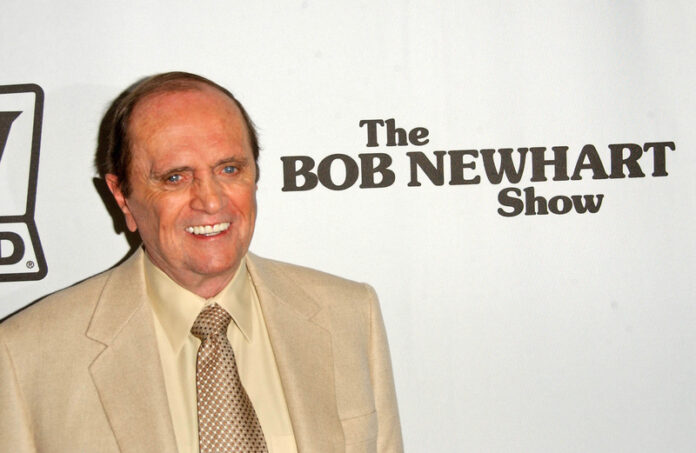Acclaimed comedian Bob Newhart passed away at his residence in Los Angeles, California on Thursday morning, July 18, 2024, following a series of brief illnesses. Newhart’s publicist, Jerry Digney, confirmed his passing. The renowned comedian was 94 years old.
Having a career that spanned over six decades, Newhart significantly impacted stand-up comedy and television. Born as George Robert Newhart on September 5, 1929, in Oak Park, Illinois, he initially pursued a career as an accountant before his breakthrough in comedy. Newhart’s first major breakthrough was his 1960 comedy album “The Button-Down Mind of Bob Newhart,” which became the first comedy album to top the Billboard charts and garnered Grammy Awards for Album of the Year and Best New Artist.
“I tend to find humor in the macabre. I would say 85 percent of me is what you see on the show. And the other 15 percent is a very sick man with a very deranged mind,” Newhart stated during a 1990 interview with Los Angeles magazine.
Newhart’s unique comedic style involved one-sided phone conversations where he would only portray his side of the conversation, allowing the audience to speculate on the other half. His deadpan delivery and observational humor made him a favorite figure in American comedy.
In 1972, Newhart played Dr. Bob Hartley, a psychologist from Chicago, Illinois, in “The Bob Newhart Show.” The show became a classic in American television, running for six seasons and receiving positive reviews. However, despite its success, Newhart did not receive any Emmy Awards for his performance on the show, which he decided to end after 142 episodes in 1978 as he felt it had run its course.
In 1982, Newhart returned to the small screen with another successful sitcom, “Newhart,” where he played the character of Dick Loudon, a New York author turned Vermont innkeeper. The show maintained its spot on CBS for eight seasons. The series concluded with one of the most unforgettable endings in television history, featuring Newhart’s character waking up next to Suzanne Pleshette, his wife from “The Bob Newhart Show,” implying that the entire series had been a dream.
“Somehow there’s a connection between numbers and music and comedy. I don’t know what it is, but I know it’s there,” Newhart shared in an interview with a college business professor. “I know it’s a case of 2 and 2 equals 5 in terms of a comedian. You take this fact and you take that fact and then you come up with this ludicrous fact.”
Despite his illustrious career, Newhart did not secure an Emmy Award until 2013 when he made a guest appearance as Professor Proton on “The Big Bang Theory.” His performance as the former host of a children’s science show earned him the award for Outstanding Guest Actor in a Comedy Series.
Newhart’s career was not limited to television, as he also had roles in several films such as “Catch-22,” “Elf,” and “Horrible Bosses.” He lent his voice to animated films like “The Rescuers” and its subsequent sequel.
In 1992, Newhart was inaugurated into the Academy of Television Arts & Sciences Hall of Fame, and he was presented with the Kennedy Center’s Mark Twain Prize for American Humor in 2002. A statue mimicking his likeness was erected on Michigan Avenue in Chicago, Illinois, depicting him seated in a chair with an empty psychiatrist’s couch next to him.
“Keep in mind, when I started in the late fifties, I didn’t say to myself, ‘Oh, here’s a great void to fill — I’ll be a balding ex-accountant who specializes in low-key humor,’ ” Newhart stated. “That’s simply what I was and that’s the direction my mind always went in, so it was natural for me to be that way.”
Newhart was married to Virginia “Ginnie” Quinn, the daughter of actor Bill Quinn, from January 1963 until her passing in April 2023. They were introduced to each other by comedian Buddy Hackett, who believed they would be a good match due to their shared Catholic faith. The couple had four children: Robert Jr., Timothy, Courtney, and Jennifer, and ten grandchildren.
Newhart’s influence on comedy and television is extensive and enduring. His unique style, marked by his pauses and stammering delivery, brought a distinctive charm to his performances that endeared him to millions. He leaves behind a legacy of laughter and warmth, appreciated by fans and fellow comedians alike.

